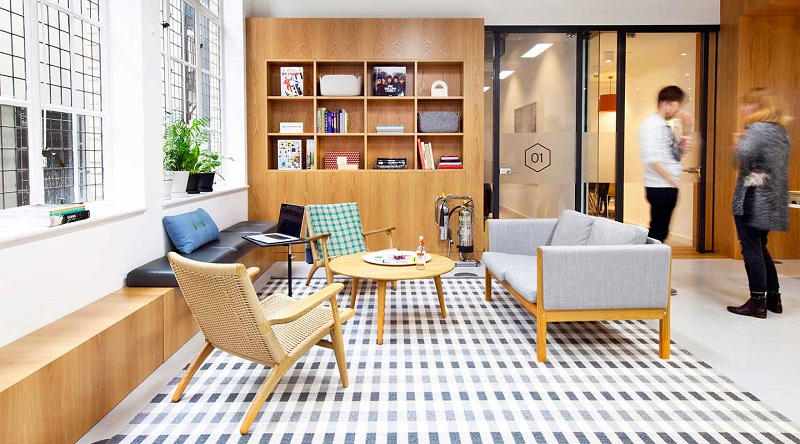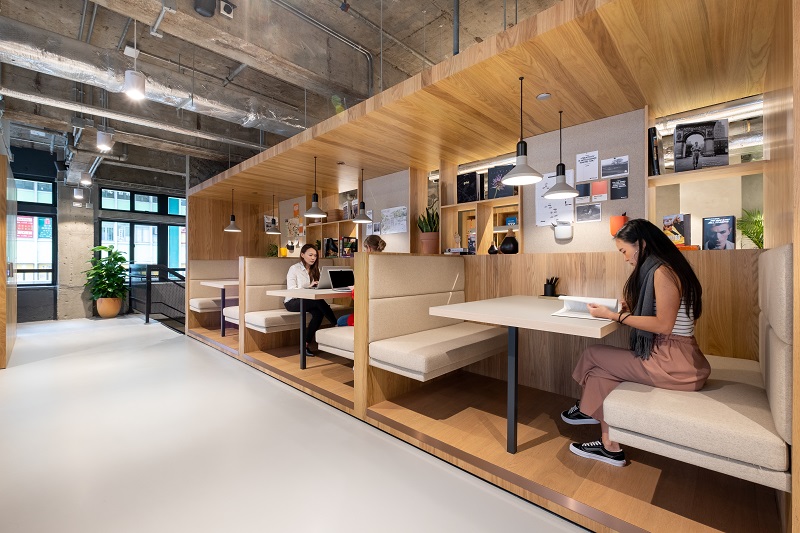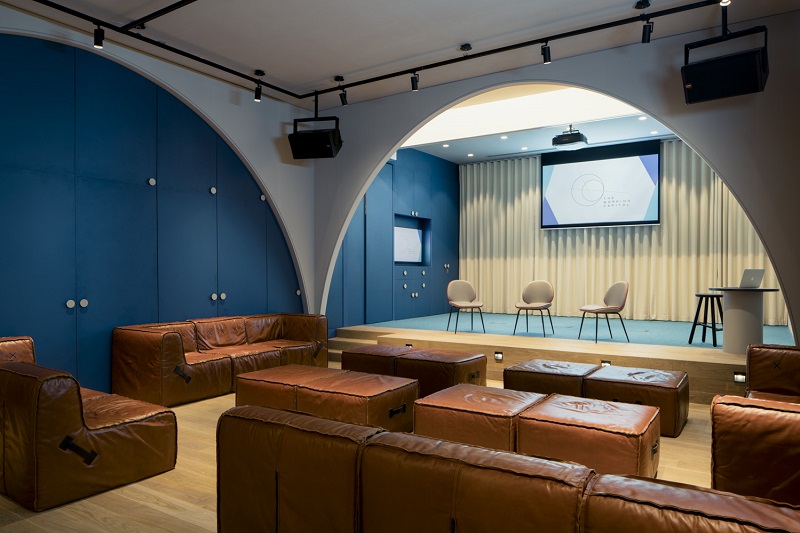
Work is made a pleasure at Spaces, which emphasises plenty of sunlight and warmth (All photos: Spaces)
If not for the reception counter at the entrance, along with a simple logo emblazoned on the wall behind it, it would be easy to mistake a Spaces centre as a café with its clean and cosy vibes.
But the Dutch-based global co-working brand’s distinctive style will soon be recognisable in Malaysia as it is marking its arrival here with a 60,000 sq ft centre at Platinum Sentral in Kuala Lumpur. This will be followed closely by a centre in Beach Street, Penang, next month and another in Menara Prestige in the heart of KL by the end of the year.
A tour of several Spaces’ offices in Singapore recently proved to be a study of one of the world’s fastest-growing players in the flexible workspace industry. It offered insights into how the company grew from one location in Amsterdam in 2006 to over 40 countries and 250 cities worldwide now, with 23 locations in Asia in just over 20 months.
placeholder_imagegallery_1.jpg

At its centres, one would note the lack of fancy entertainment or gimmicky fixtures. “Some [co-working spaces] have pumping music, some have funky lighting and furnishings, foosball and pool tables … and many have that big, completely open space — that’s not really us,” said a manager at one of the four Spaces we visited across the Causeway. “We believe in providing a good, practical environment for working, providing the support for your working and business needs, but with the added element of community.”
Bought over by office rental giant IWG (formerly known as Regus) in 2015, Spaces differentiates itself by having a hybrid model of private office spaces in a shared community environment. While it offers hot desks, reserved desks and meeting rooms, which are also available for booking by the public, the firm’s predominant clientele are its private office members.
The marriage of the traditional office environment and the dynamism of a commune space has found success among major corporations and multinational brands. Rather than commit to big office spaces in their international outposts, these companies find the element of co-sharing and interactivity with other businesses appealing, enticing them to take up private floors or sections within a Spaces office.
spaces_-_05.jpg

This, in turn, becomes a draw for smaller companies, small and medium enterprises and start-ups to join the fold. “A lot of them want an opportunity to engage with some of the larger boys, the established companies,” says Vijayakumar Tangarasan, country head for Malaysia, Indonesia and Brunei at IWG. “On top of that, members are given opportunities to present their business and product ideas through networking events. And if you’re a Spaces member, you get access around the world. So for businesses that want to grow out of the country, this is attractive.”
At the heart of Spaces’ community building is its “business club lounge” concept. Always located near the main walk-in area, it functions like a house’s living room, one that draws the household together, adds Vijayakumar.
Sevil Peach, a renowned architectural designer who created the original blueprint for Spaces, crafted his concept from the mottos of “comfortable, social and collaborative”, fanned by a belief that as the nature of innovation and collaboration shifts, so too must the design of spaces that fosters it.
Understanding the balance between segregation — to facilitate focus at work — and the need to encourage interaction in order to build a community, the design team calculates even the likelihood of people passing each other on the stairs, making them a point of commune, as well as strategically places coffee machines in dedicated café areas in the heart of the building rather than in isolated corners.
the-working-capitol-on-robinson-the-assembly-event-venue-1.jpeg

Visually, Spaces takes a quintessentially European approach that is sophistication and muted elegance over ostentation. Quality and refinement are expressed in substance rather than just aesthetic, as seen in its choice of furniture — brands used include Swiss designer Vitra, particularly its classic Alcove Chair by Ronan and Erwan Bouroullec; Danish company HAY, which is known for its modern Scandinavian designs; and textile company Kvadrat, which contributes to the generally neutral and pastel hues that define Spaces’ overall palette.
Another defining philosophy of its design DNA is the use of materials in their “true nature” as much as possible. This we see in the former industrial building at City Hall, with its exposed ceilings and raw concrete finish, and in the slightly more swanky contemporary office in Robinson Road, with its subtle New York Art Deco flair. In every space, warm wood tones and natural light are prioritised, while furnishings do not dominate or overwhelm but allude to Spaces’ tongue-in-cheek tagline: “Welcome home. Oops, we meant welcome to work.”
“Consistent and recognisable” may not be popular descriptions when it comes to design, but the Spaces design team and the templates it offers seem to value them, creating a calm and professional setting in all its offices. This allows “one to be inspired without being loud or forcing someone else’s culture on you”.
That is not to say that the interior has to be bland or uniform — decorative accents in the right places create unobtrusive but welcome diversions when needed. Witty quotes pepper the commune areas, often seen alongside artworks by local artists for a personalised touch, while jars of coloured pencils at every corner serve as down-to-earth ornaments and practical stationery, serving as a feature that has become a beloved hallmark of both the brand’s spirit and its offices around the world.
Spaces, Block D, Convention & Entertainment Centre, Level 3, 4 & 5, Jalan Stesen Sentral 2, Kuala Lumpur. 03 9212 1178.
This article first appeared in No. 93, Autumn 2019 issue of Haven.


